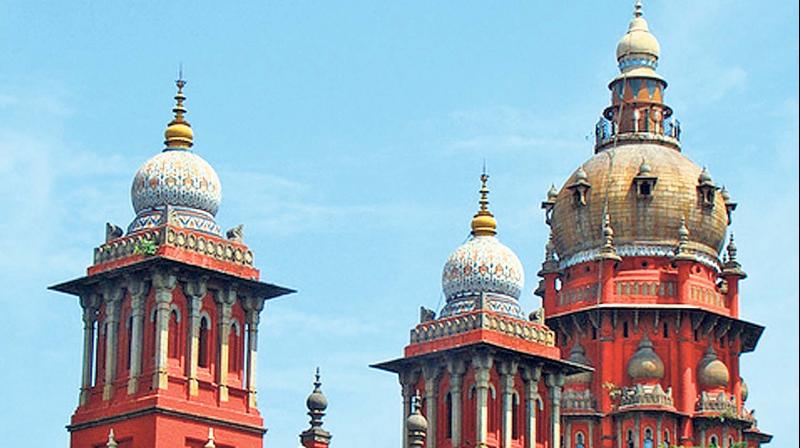Symbol row: Madras high court admits petition

Chennai: Observing that it is a fit case which requires consideration and adjudication, the Madras high court has admitted a Public Interest Litigation, which sought a direction to the Election Commission of India to declare as illegal, the acceptance of the Form B submitted by the DMK nominated candidates and Members of Parliament T.R. Paarivendhar, D.Ravikumar, A.Ganesha Moorthy and P.Chinraj and AIADMK nominated candidate K. Krishnasamy during the April 2019 Lok Sabha polls in Tamil Nadu.
A division bench comprising Justices M. Sathyanarayanan and N. Seshasayee before whom the PIL filed by advocate M.L.Ravi, also president, Desiya Makkal Sakthi Katchi came up for hearing also ordered notice to ECI, DMK, AIADMK and the five candidates.
Calling for the records in eight weeks, the bench posted to Nov 12, further hearing of the case.
According to petitioner, the symbols were allotted as per the Election Symbols (Reservation and Allotment) Order, 1968 as and when the candidates submit Form B (notice to name the candidate set up by the political party).The symbols were classified into reserved symbols and free symbols. The reserved symbols were allotted exclusively to the registered recognized political parties and free symbols were allocated to registered political parties and independent candidates, he added.
He said in the April 2019 Lok Sabha polls, the DMK party nominated candidate to Namakkal Parliamentary Constituency, P.Chinaraj, who was a member and state executive of Kongu Makkal Desiya Katchi, a registered political party with ECI, it nominated to Villupuram Parliamentary constituency D. Ravikumar, who was a member and general secretary of VCK, which was a registered political party with ECI, it nominated to Erode, A. Ganesamurthy, who was a member and district secretary of MDMK, which was a registered political party with ECI and it nominated to Perambalur, T.R. Paarivendhar, who was founder and president of Indiya Jananayaka Katchi, which was also a registered political party with ECI. The AIADMK nominated to Tenkasi Parliamentary Constituency, K. Krishnasamy, who was the founder and president of Puthiya Thamizhagam Party, which was a registered political party with ECI. The issuance of Form B to these candidates by political parties and certifying and declaring them as their party members, where the candidates without even resigning from their original party and post of office-bearer held, in which they were members, was illegal and against law, Ravi added.
He said despite each of the five candidates was a member of a particular registered political party, in Form B Declaration, the said fact has not been disclosed either by the party who allotted their reserved symbol nor the five candidates made a declaration that they were already the members of the registered political parties.
The counsel for the petitioner has also drawn the attention of the court to the hand book for returning officers, which stated that “the symbol order does not recognize electoral alliances which are often entered into by political parties. Therefore, a registered or recognized political party should not be allotted by returning officer any reserved symbol of another recognized political party even with the consent of such latter party with whom it has entered into an electoral alliance for the purpose of contesting an election. Returning officer should be strictly guided by the provisions of paragraph 13 and 13A of the Symbols Order in all cases of allotment of symbols to candidates set up by political parties”. Objections have also been raised. However, the electoral officer concerned has failed to take cognizance of the same, he added.
In its order, the bench said the main purport of the election symbols (reservation and allotment) order was that this country was having a large population of illiterates and semi-illiterates and one of the modes to recognize a candidate to whom an electorate want to exercise their franchise, was to recognize through symbol oder and therefore, the symbol always play a vital role in any elections, held or being held. A perusal and consideration of the materials placed before this court would prima facie disclose that the private respondents (candidates) were members of registered political parties and in their favour, the DMK has allotted their symbol and they have also become successful. Therefore, the DMK may also be under mandate to disclose the fact of allotment of their symbol in favour of the private respondents who were admittedly, the members of registered political parties and correspondingly, the private respondents may also under equal obligation to disclose the fact that they were members of registered political parties and however, in Forms B submitted by them, they did not disclose the said fact, the bench added.

